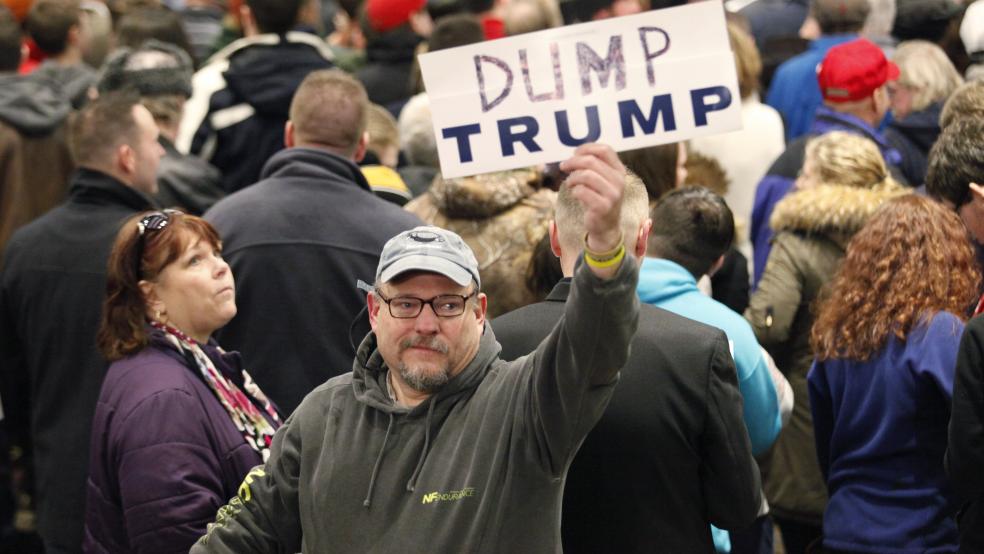Four years ago, when the president was running for his second term, Donald Trump went on a tear, determined to prove that Barack Obama was not born in the United States. In his usual bombastic way, Trump not only accused Obama of not being an American, but hinted that he was part of a larger international conspiracy to destroy the country.
Because of his passion and clear vitriol for President Obama, who at that time had good approval ratings, Trump was urged to run for the highest office in the land. “You should run for president,” his friends and family might have said – just like any one of us might say the same thing to a colleague or a friend who shares our political ideals.
Related: 6 Questions Donald Trump’s Supporters Need to Answer Right Now
Trump took the idea seriously, possibly because he misconstrues applause and off-handed compliments as love and admiration. Running for president could have fed Trump’s “high extroversion,” a trait specific to Trump identified by a psychologist in a recent profile in The Atlantic.
Today, as we look at the outcome of Trump’s candidacy as the presumptive nominee of the GOP, here’s what he has left in his wake:
- A crippled and nearly destroyed Republican Party
- Republican voters ashamed to be Republicans
- Democrats who are thrilled that Trump is running against Hillary Clinton
- Minority groups – especially Hispanics and Muslims – who feel even more marginalized
- A press corps still trying to be fair while dealing with a serial liar.
The latest Bloomberg poll shows the Trump “myth” is starting to crumble. Clinton is ahead 12 points among all voters (49 to 37 percent, with Libertarian Gary Johnson at 9 percent), and 63 percent of all women say they could never vote for Trump.
The tipping point was probably Trump’s attack on U.S. District Judge Gonzalo Curiel, who is adjudicating a lawsuit against Trump regarding fraud at Trump University. Trump claimed the judge was Mexican (Curiel is 100 percent American, born in Indiana to Mexican parents) and then accused the judge of bias because of his heritage and because of Trump’s promise to build a wall on the U.S. southern border to keep out illegal immigrants.
Related: Six Choices for Trump’s VP with Military Cred
This exposed Trump’s paranoia to voters and made many of them realize that Trump could hold them accountable for anything in their backgrounds, including their ethnicity.
One of the main reasons voters turned to Trump was because of his claims of being a great business person who would bring back jobs and set a winning course for America’s economy. But Trump’s self-descriptions as a “winner” and a “success” have been debunked by press reports regarding many of his businesses. In addition to the charges of fraud at Trump University, where students paid as much as $35,000 to learn how to be successful real estate investors, Trump has a dubious record when it comes to winning in commercial real estate.
USA Today investigated Trump’s business dealings and found that the billionaire doesn’t always pay his bills. “Donald Trump casts himself as a protector of workers and jobs, but hundreds of people – carpenters, dishwashers, painters, even his own lawyers – say he didn’t pay them for their work.”
For many Americans, who are told at school and in the workplace that there’s “zero tolerance” for bullying, Trump’s behavior has shocked some and liberated others. His attacks on political correctness (think college students who turn in their classmates or professors for “micro-aggressions” or not having a “trigger warning” about a subject that might make them feel bad) have resonated with Americans who believe that free speech is threatened.
But Trump’s relentless attacks on anyone who challenges his dominance are not free speech – they’re second grade name calling and intimidation that Trump calls “winning.” Trump isn’t a winner – he’s Biff Tannen, a bully and a loser.
Related: Obama to GOP Leaders: Do You Actually Agree With Trump?
The New York Times collected “The 224 People, Places and Things Donald Trump Has Insulted on Twitter: A Complete List.” This is worth reading, if for no other reason than to see how he deals with what he sees as threats — the press, lawyers, Germany, Iran, Mexico, Washington, D.C. — and easy marks.
One thing is clear after reading the list of insults: Trump is not really a Republican. Nor is he anything when it comes to politics. He is his own self-contained world of judgment on every issue, domestic and global.
When you’re Donald Trump, there’s no need for advisors when you’re always right.




